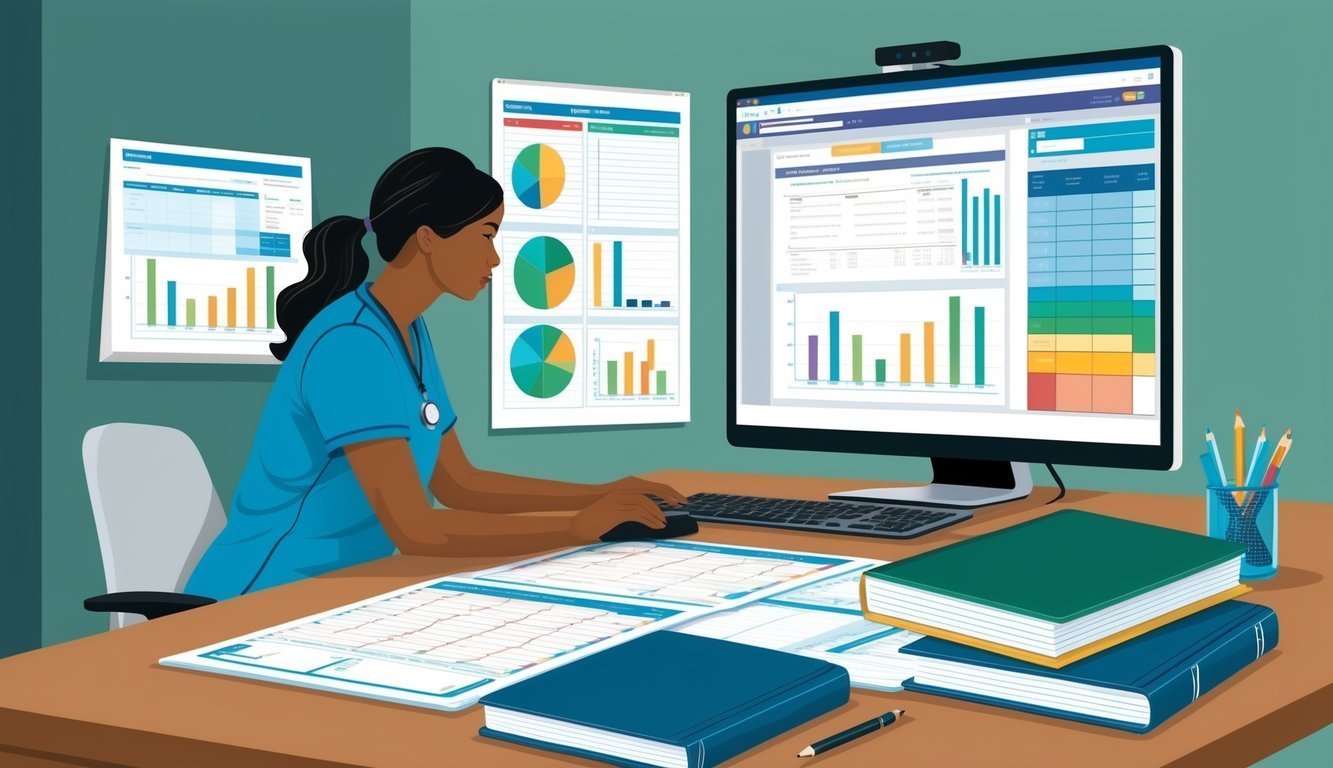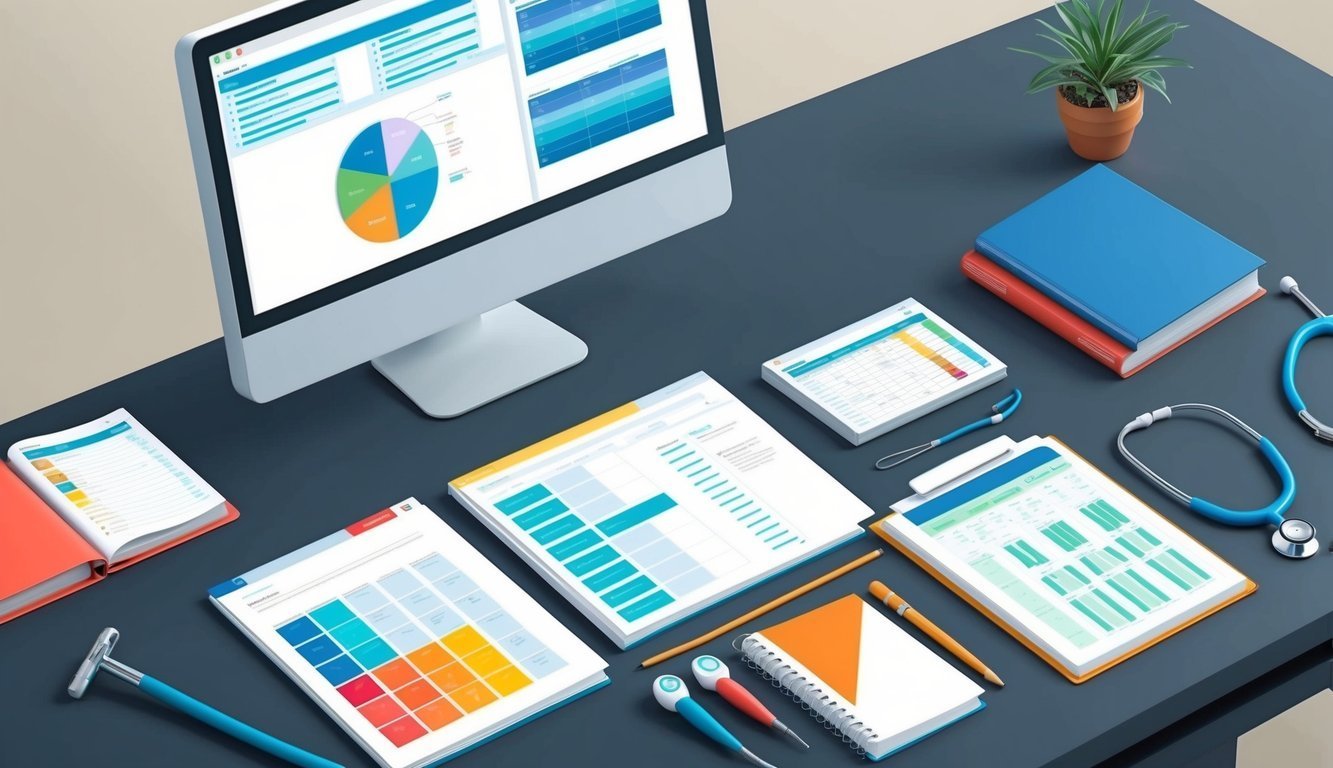Medical billing and coding is a vital aspect of the healthcare industry, ensuring that healthcare providers are compensated accurately for their services.
A certificate in medical billing and coding can provide you with various job opportunities that are both rewarding and in high demand.
This career not only offers a chance to contribute meaningfully to patient care but also provides a stable income with the potential for growth.
If you are considering a career in this field, it’s essential to understand the skills required and the paths available to you.
Entry-level positions often require only a high school diploma or GED, but further certification can significantly enhance your prospects and earning potential.
Professionals in this field typically earn around $48,780 per year, which can vary based on location and experience.
As the healthcare system evolves, the need for skilled medical billers and coders continues to grow.
Exploring this career path can lead you to a fulfilling job where you play an essential role in the healthcare ecosystem.
For more detailed information on job opportunities, you may want to check resources like Indeed or Nurse.org.
Understanding Medical Billing and Coding
In the healthcare industry, medical billing and coding serve crucial roles in the administration of patient care.
These professions ensure that healthcare providers are compensated for their services while maintaining accurate medical records.
Below are key components that outline the essential aspects of this field.
Essential Roles and Definitions
Medical billing and coding are distinct yet interconnected functions.
-
Medical Coding: This process involves translating healthcare services into universally recognized codes. You use systems like CPT (Current Procedural Terminology), HCPCS (Healthcare Common Procedure Coding System), and ICD-10-CM (International Classification of Diseases, 10th Revision, Clinical Modification) to classify diagnoses and procedures.
-
Medical Billing: This is the administrative aspect where you prepare and submit claims to insurance companies. Accurate coding ensures that billing matches the services provided, facilitating timely payments.
Understanding these definitions helps you navigate the responsibilities of a medical coder and biller, both integral to effective healthcare administration.
The Importance of Medical Terminology and Anatomy
Familiarity with medical terminology and human anatomy is vital for success in medical billing and coding.
You need to comprehend the language that healthcare professionals use for precise documentation.
-
Medical Terminology: Knowing the correct terms ensures accurate coding. Misunderstandings can lead to improper billing and claim denials.
-
Anatomy: A solid grasp of anatomy helps you understand the procedures and diagnoses. This knowledge enables you to identify appropriate codes and ensures clarity in communication with healthcare providers.
Incorporating these elements into your education will enhance your proficiency and accuracy in these roles.
Medical Coding Systems: CPT, HCPCS, and ICD-10-CM
Mastering coding systems is fundamental for effective medical coding.
Each system serves a specific purpose:
| Coding System | Purpose | Usage |
|---|---|---|
| CPT | Codes for outpatient procedures and services. | Used by healthcare providers for billing. |
| HCPCS | Codes for non-physician services, including durable medical equipment. | Often used for Medicare claims. |
| ICD-10-CM | Codes for diagnoses and inpatient procedures. | Required for all insurance claims. |
You must be adept at these systems to ensure accurate coding and minimize billing errors.
Understanding their structure will lead to more efficient claims processing and improve your career prospects.
Entering the Profession

Entering the medical billing and coding field requires a clear understanding of educational pathways, certification options, and potential career trajectories.
These elements are crucial for building a successful career in this growing sector of the healthcare industry.
Education Requirements and Training Programs
To enter the medical billing and coding profession, you typically need a high school diploma or GED.
Many choose to pursue specialized training through certificate or diploma programs, which can often be completed in less than a year.
Common Educational Options:
| Program Type | Duration |
|---|---|
| Certificate Program | 6 months to 1 year |
| Associate Degree | 1 to 2 years |
Complete programs cover essential topics such as medical terminology, coding systems (like ICD and CPT), and billing procedures.
Some programs are available online, offering flexibility for working individuals.
Certification Overview: CPC, CCS, CCA
Obtaining certification is a significant step that can enhance your job prospects and salary potential.
Key certifications include:
- Certified Professional Coder (CPC): Offered by the AAPC, it’s highly regarded in the industry and focuses on outpatient coding.
- Certified Coding Specialist (CCS): Provided by the AHIMA, this certification is for those who specialize in hospital coding.
- Certified Coding Associate (CCA): This entry-level credential is ideal for those newer to the field and seeking foundational knowledge.
Having certification demonstrates your expertise and commitment, making you a more attractive candidate for employers in the healthcare industry.
Career Paths and Entry-Level Positions
Once you have attained the necessary education and certification, several entry-level positions are available.
Typical roles include:
- Medical Coder: Responsible for translating patient information into standardized codes for billing and records.
- Billing Specialist: Focuses on managing billing processes and ensuring accuracy in patient accounts.
With experience, you can advance to positions like coding supervisor or compliance auditor.
The demand for coding specialists continues to rise, offering various opportunities for career growth in this essential sector of healthcare.
Skills and Attributes for Success

To excel in a medical billing and coding career, you need a combination of soft skills, technical proficiency, and strong organizational abilities.
These skills ensure efficient performance and effective communication within healthcare settings.
Soft Skills: Communication and Interpersonal Abilities
Effective communication is crucial in medical billing and coding.
You interact with patients, healthcare providers, and insurance companies regularly.
Clear communication helps avoid misunderstandings and ensures accurate billing processes.
Key soft skills include:
- Active listening: Understanding patient needs and inquiries.
- Empathy: Building rapport to foster trust when addressing concerns.
- Conflict resolution: Navigating disputes over billing or coding issues.
These interpersonal abilities enhance collaboration and contribute to a positive work environment.
Technical Proficiency: Coding Experience and EHR
Your technical skills are vital in medical billing and coding.
You should have extensive knowledge of coding systems such as ICD-10 and CPT.
Mastery of these codes ensures accurate representation of diagnoses and procedures.
Familiarity with Electronic Health Records (EHR) is essential.
It allows you to:
- Access patient records efficiently.
- Enter billing information accurately.
- Ensure compliance with legal and ethical standards.
Proficiency with billing software enhances productivity and streamlines claims submissions.
Organization and Attention to Detail
Being organized and detail-oriented is paramount.
You must manage various tasks, deadlines, and patient information simultaneously.
Strong organizational skills help you prioritize responsibilities, ensuring timely submissions and accurate records.
Attention to detail prevents errors in billing and coding.
Minor mistakes can lead to significant financial repercussions.
Here’s what to focus on:
- Review codes and documentation meticulously.
- Maintain accurate records of patient interactions.
- Double-check submissions to reduce billing discrepancies.
By honing these organizational and detail-oriented skills, you increase your effectiveness in the medical billing and coding field.
Professional Growth and Advancement
Achieving success in a medical billing and coding career entails navigating various growth opportunities.
Understanding the pathways to advancement, the importance of ongoing education, and the value of mentorship can significantly enhance your career trajectory.
Career Advancement Opportunities
There are numerous pathways for advancing your career in medical billing and coding.
You can pursue specialized certifications, such as Certified Professional Coder (CPC) or Certified Coding Specialist (CCS).
These credentials not only enhance your qualifications but also open doors to higher-paying positions.
In addition, consider roles like health information manager or compliance officer.
These typically require more experience and education but offer substantial rewards.
Many employers promote from within, so demonstrating leadership and initiative can position you for promotions.
The Role of Continuing Education and Networking
Continuing education is crucial in this dynamic field.
Engaging in regular training helps you stay updated with the latest coding practices and regulations.
Online courses, webinars, and workshops can bolster your skills and knowledge.
Networking is equally vital for career advancement.
Joining professional organizations, like the American Academy of Professional Coders, can provide invaluable resources.
Attend industry conferences, seminars, and local chapter meetings to connect with peers.
Building relationships can lead to job referrals and mentoring opportunities.
Finding Guidance Through Mentorship
Having a mentor in the medical billing and coding field can be a game changer.
A mentor can provide insights into best practices, industry trends, and potential career paths.
Seeking out someone with experience allows you to learn from their successes and challenges.
Look for mentors through professional organizations or networking events.
Consider reaching out to colleagues who inspire you or have achieved the goals you aspire to reach.
Establishing a mentor-mentee relationship can help clarify your professional goals and enhance your development within the field.
Industry Outlook and Trends
The medical billing and coding field is experiencing significant growth, driven by advancements in technology and the increasing demand for healthcare services.
Understanding job prospects, work-from-home options, and technological trends is essential for anyone considering a career in this industry.
Job Outlook and Market Data
According to the U.S. Bureau of Labor Statistics, employment for medical records and health information technicians is projected to grow 8% from 2029 to 2039, which is faster than the average for all occupations.
The median annual wage for these positions was approximately $62,160 in 2023, reflecting a competitive compensation for qualified individuals.
Table: Job Outlook Overview
| Category | Data |
|---|---|
| Projected Growth Rate | 8% (2029-2039) |
| Median Annual Wage | $62,160 |
| U.S. Job Market | Growing Demand |
This trend indicates a robust job market, particularly for those with certifications such as the Certified Professional Biller (CPB), enhancing job prospects and earnings.
Work From Home Opportunities
The flexibility of remote work in medical billing and coding has expanded significantly.
Many employers now offer full-time remote opportunities, allowing you to work from home.
This option is especially appealing, as it eliminates commuting and provides a better work-life balance.
Key Benefits of Remote Work:
- Flexibility in scheduling
- Reduced commuting time and costs
- A broader range of job opportunities across the U.S.
With the rise of telehealth and digital records management, the demand for remote medical billing specialists is expected to increase, making this a viable option for many professionals in the field.
Technological Advancements Impacting the Field
Advancements in technology constantly change the medical billing and coding landscape.
Innovations like electronic health records (EHR) and billing software streamline processes and improve accuracy.
Understanding these tools is crucial for success.
Technological Trends to Watch:
- AI is increasingly used for billing processes
- Cloud-based systems are being adopted for better data management
- Enhanced cybersecurity measures are being implemented to protect patient information
Staying current with these technologies can improve your efficiency and effectiveness.
By embracing these changes, you can ensure your skills remain relevant in a fast-paced healthcare environment.

